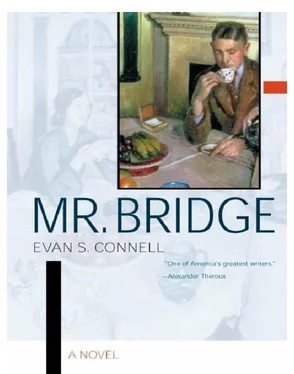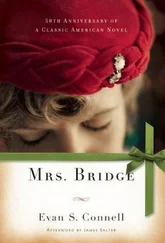That night, before hanging his trousers in the closet he took the change out of his pocket and left it on the dresser as he always did, but the next morning he forgot it. When he came home in the evening the coins had disappeared. He supposed his wife had picked them up, but she said she had not touched the money. She had noticed it on the dresser after he left for work, but she had left it where it was. She suggested that Harriet might have put the money in a dresser drawer while she was cleaning the bedroom, but he had looked in the dresser drawers. The coins were gone. He walked into the kitchen and found Harriet filling a tray of chocolate eclairs with whipped cream. He asked if she had seen the coins. Harriet thought for a minute, then said she had not. There was no money on the dresser when she went upstairs to make the beds. She was sure of this, she said, because she had straightened the things on top of the dresser and surely would have seen any money lying there. He asked if anybody else had been in the house during the day. Harriet said that as far as she knew nobody except the children had been in the house. He did not want to ask the children; if one of them had taken it he, or she, ought to mention it. So he waited, thinking that when they were all together at the dinner table somebody would speak up. But during the meal nobody said anything, and he realized he had waited too long. To ask about it now would sound like an accusation.
Later that night Mrs. Bridge asked if he had found the change. He answered that he had not, and indicated by his tone that he did not want to talk about it again. However, he continued to think about the missing money. He wanted to believe that Harriet had stolen the coins. There was no proof that she had not. The incident troubled him because it never was resolved. It bothered him like a small sore which healed underneath a scab; and this, too, disappeared at last. But it left a little scar.
Christmas that year was memorable because of a card from Senator Bailey. They had never before gotten a card from him.
“He’s up for re-election,” Mr. Bridge answered when his wife wondered why they had been included on the senator’s mailing list. The sight of the card and the thought of Horton Bailey irritated him. “The man is a ‘deadbeat,’ as I’ve told you before. I have no use for him whatsoever. I wouldn’t cast my vote for Horton Bailey if he was the only candidate on earth. The man is no good. He’s no good, I tell you. He never was any good. He never will be any good!”
“My word, you sound so final,” she said, and pinched his arm.
“I have no respect for a man who welshes on a debt. And that is final.”
He could imagine Bailey’s response if the debt was mentioned — the false heartiness; the harsh, loud laughter; a vigorous, professional slap on the back. Then another booming laugh out of the freckled Irish face as though both of them agreed it was beneath their dignity to talk of such a thing as an old debt. The debt would never be paid. It would never be honored; and every time he thought about this his thin features seemed to become even thinner, and he appeared to be contemplating a repulsive spectacle.
After his first glance at the Christmas card he avoided looking at it. He felt like throwing it in the fireplace, but sensed that his wife was flattered by it. Not everybody received a Christmas card from a senator. She had never said as much, yet he suspected this was how she felt, so he left it where she had placed it on the mantel beside the little painted wooden creche and the celluloid angels.
Christmas Day a little before noon Mr. and Mrs. Bridge were standing in the front yard under the old elm tree. The elm was dying, although the previous summer a tree surgeon had lopped off several branches and done whatever else he could to save it. Both of them were fond of this tree. They did not know how old it was, but very probably it had stood rooted to this spot for at least half a century. They considered it sadly and talked about whether they should have it cut down, because it might break and crash against the house. The bark of the tree was dry and thick, cracked into corky brown ridges. The limbs protruded lifelessly. Silhouetted against the freezing blue sky, it was clear that death lived within the tree.
While they were standing next to it Douglas appeared around the corner of the house carrying a large gray squirrel. He was holding the squirrel by the tail so that it hung down like a rag. The paws extended stiffly from the limp, swaying body as though the animal was reaching for something. In his other hand Douglas carried the air rifle he had gotten just that morning.
Mr. Bridge observed the squirrel with surprise because he had assumed the air rifle was not powerful enough to kill anything much bigger than a caterpillar. He saw a red bead gather on the squirrel’s nose and drop like a ruby into the snow. Then he realized that his wife was watching; she was waiting to see what he would do about this.
The front door opened. Carolyn came out of the house. She looked at the squirrel with distaste because it was dead, and folded her arms as she had seen her mother do when something was wrong.
Douglas, for his part, was disconcerted. He had not expected to walk into an audience. Rather uncertainly he held the squirrel up for inspection, in case anybody wanted a closer look.
Mr. Bridge knew he was expected to judge the situation. A gun, a hunter, a dead animal. But because he did not know exactly how he felt, he did not know what attitude to take; he felt only the presence of his wife and his daughter forcing him toward a resolution with his son. This silent female insistence annoyed him. He spoke to his son sharply: “Now that you’ve shot it, what do you intend to do with it?”
Douglas thought this over. Then he said, “Can’t we eat him?”
Carolyn made a face and a gagging noise.
“We have meat enough for the table,” said Mr. Bridge.
“I was thinking if we wanted him we could fix a stew, maybe. Only I want his pelt.”
“So you think you are going to skin it, do you?”
Douglas murmured and nodded. He jiggled the squirrel, and another drop of blood sank into the snow.
Mr. Bridge felt the increasing pressure of the two women. They were not going to speak. They were going to wait. They had done this before when they disapproved of something. According to them, a little animal had been killed for no reason, that was all there was to it. They understood nothing beyond that, and they wanted the killer punished. But Mr. Bridge began to feel the obstinate power of his son opposing them with the male conviction that it is right to kill animals. Now he was expected to rule in favor of one of these philosophies.
To his son he said, “Have you ever tried to skin a squirrel? ”
Douglas answered that he had cleaned fish. He and his friends with the reluctant assistance of grasshoppers and worms had pulled a number of small perch and sunfish out of Crystal Lake. A few of these specimens were large enough to eat, so Harriet had fried them for his lunch.
“Cleaning a fish is not the same as skinning a squirrel,” said Mr. Bridge.
Then Douglas grew stubborn. “How do you know? Did you ever skin one?”
Mr. Bridge replied that he had.
“Well, I can too,” the boy said, and he held the dead squirrel confidently. At his belt was a Boy Scout sheath knife.
“What will you do after that?”
“What do you mean?”
“What will you do with the skin?”
“I’ll stretch it on a board and hang it in my room.”
“Oh no,” his mother said. “Oh, no, you will not, young man. I put my foot down.”
Читать дальше












